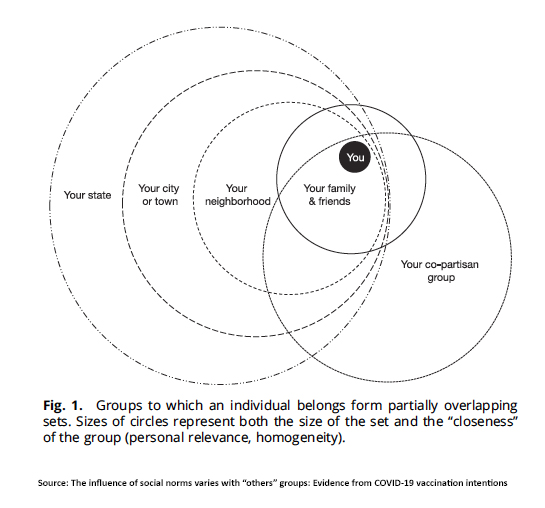While the study looked at the intention to get a COVID vaccination, its results are generalizable to other issues. The researchers used roughly 1,800 survey participants matched for gender, race, “highly similar age,” education, and family income. They also attempted to match them for COVID risk factors and health behaviors not associated with risk. They also matched for political party, ideology, trust in government, religiosity, COVID knowledge, and their subjective belief that this knowledge was correct. (I discuss a study of the relationship between objective and subjective knowledge here.)
That is a lot of matching. While the researchers took pains to ensure that the groups were comparable, they were not perfectly matched, reflecting the primary limitation of their findings. Apply grains of salt as you wish.
 The researchers compared the intention to vaccinate of the members of the study group to their perception of the behavior of several “other” groups. The study group was unclear about their intentions, somewhere between “not sure” and “maybe will.”
The researchers compared the intention to vaccinate of the members of the study group to their perception of the behavior of several “other” groups. The study group was unclear about their intentions, somewhere between “not sure” and “maybe will.”
As the graphic depicts, the others included family and friends, neighbors, your town, state, and “partisan” groups. The researchers found that the perception of the intent of others was predictive of the subject’s intention – with one crucial caveat. The strength of that predictive ability declined as the “other” became more distant, larger in size, and more heterogeneous. As we might expect, our perception of those closest to us, our family and friends, were the most predictive of our behavior. And it held to a similar degree for our neighbors but declined with those larger groups, town, and state.
The predictive ability of our partisan affiliation showed an interesting pattern. Among Republicans, the perceived intent of other Republicans was a strong predictor, just after family and friends, before neighbors. This did not hold for Democrats; the intention of other Democrats was not a driver. The intention of the “out-partisans” (Democrats for those who were Republicans and Republicans for those who were Democrats) had no impact at all.
Another interesting finding was that risk perception had a small impact but was overshadowed by the perceived intention of our family and friends.
The researchers point to two limitations. They cannot tell whether the influence of these groups was “a desire for reward or fear of sanction,” and they could not separate family from friends. But this does not take away from the main conclusion of the study:
“The social norms–vaccination relationship was unequivocally strongest for the friends and family group….”
From the point of view of public health messaging, we again see that those public service announcement appeals are ineffective. Our behavior is more heavily influenced by those closest to us, our kith and kin. That makes changing hearts and minds a bespoke process between individuals; it will not scale.
For both sides of the political aisle, it is “monkey see, monkey do.”
Source: The influence of social norms varies with “others” groups: Evidence from COVID-19 vaccination intentions PNAS DOI: 10.1073/pnas.2118770119




